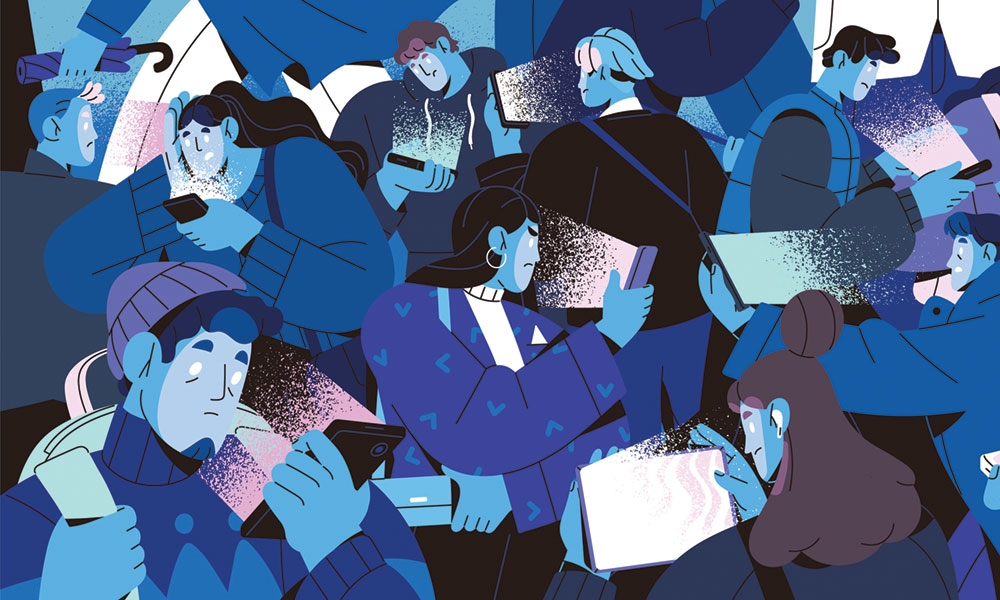
Nomophobia: Why device addiction is costing more than spondulicks
Getting your Trinity Audio player ready...
Have you ever found yourself trying to scroll down or pinch a physical page in a book or magazine? This has happened to me more than once. I’m reading a magazine such as, oh I don’t know, FAITH Magazine, and there is a photo of something that grabs my interest. Before I know it, I’m trying, unsuccessfully, to zoom in on it. It’s at that point that I take a step back and decide that this time, for sure, I’m going to cut back on the amount of screen time I allow myself.
Have you ever found yourself trying to scroll down or pinch a physical page in a book or magazine? This has happened to me more than once. I’m reading a magazine such as, oh I don’t know, FAITH Magazine, and there is a photo of something that grabs my interest. Before I know it, I’m trying, unsuccessfully, to zoom in on it. It’s at that point that I take a step back and decide that this time, for sure, I’m going to cut back on the amount of screen time I allow myself.
Recently, over dinner, my wife asked me, “How many slang words do you know for ‘money’?” I came up with three: “spondulicks,” “moolah,” and “readies.” She then added the word “bread” to the list. After that, we ran aground. There was an embarrassing pause until I pulled out my smartphone and googled it, which resulted in a further 76 items for the list (some of which seemed rather dubious, by the way). It was then that I realized that my tolerance for solid effort had dropped from several hours of study during my college days (well, OK, several uninterrupted minutes of study) to about 10 seconds of mental thrashing around before I gave up and reached for my phone. I don’t believe I am waging a lone battle against nomophobia — the fear of being without a mobile device. This sad state of affairs seems to have reached epidemic proportions among us.
Many of us, I’m sure, have witnessed the scene. You see a group of people all sitting together in an airport lounge, or waiting in line at a department store, or even just relaxing in a living room. They are all on their phones, either playing some electronic game, “researching” something on the internet, or texting someone (and, for all you know, they may be texting someone who is actually standing beside them). The art of convivial conversation is on its deathbed and is in danger of shuffling off this mortal coil forever.
Now, you may think I’m some old fogey who has never recovered from the switch from gas lighting to electricity. But I’m not. I’m an old fogey who is trying to look at the world through the rose-tinted spectacles of what is good for the human person. It can’t be good for any of us to divest ourselves of the faculties we need to simply connect with real people who are fully and physically present.
This unprecedented development in the human person also has spiritual implications. Can we sit during a one-hour Mass without checking our phones (perhaps for an alternate homily)? But more than that, can we spend more than 10 minutes in personal prayer before the Lord without distracting ourselves by reading our most recent emails?
To quote Saint John the Evangelist, “we cannot love God, whom we have not seen, if we do not love others, whom we have seen.” (1 Jn 4:20) Similarly, if we find being physically present to those around us impossible, what are the chances that we can be present to God in prayer?
Jesus’ injunction to “love one another as I have loved you,” requires our paying attention to each of the people whom we encounter in the course of a day. How did Jesus love us? Throughout his ministry, he did not wave a hand over the crowd and shout, “Be healed!” Instead, he healed individuals, one at a time, paying attention to that person’s unique needs. It is not recorded in the Gospels that he ever said, “Hold the healing a second while I reply to this text …”
It’s worth thinking about how much time we spend in the virtual world and how present we are to those we meet. Jesus still wants to attend to our personal need for love and affirmation. Let’s try to do the same with other people. Let’s drop the electronic devices for a moment and love one another as he is loving us right now.



